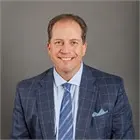Your financial well-being is way too important to leave to chance. When seeking a financial advisor, it’s like finding that perfect dance partner – you gotta feel that effortless flow and confidence in their guidance. Selecting the right advisor will make or break your financial goals, so buckle up! We’re diving into the must-haves before signing on the dotted line.
Choosing the ideal financial advisor is about:
- Fiduciary Duty: Are they legally bound to put your interests first?
- Verified Credentials: Do they have the right alphabet soup for your needs (think CFP®, CFA®, etc.)?
- Clear Focus: Do they specialize in your pain points - retirement, taxes, etc.?
- Fee Transparency: How they get paid impacts your bottom line!
- That Lovin' Feeling: Do you feel comfortable and understood?
Your financial dreams deserve a champion. Find a financial advisor who will fight for your goals like they’re their own.
Why Choosing the Right Planner Matters
Seeking financial advice is like embarking on a treasure hunt. The right financial advisor becomes your trusty map, decoding complex markets and pointing you towards buried financial treasure (or at least towards sensible savings goals!). A sub-par advisor, however, might lead you down a path riddled with potholes and hidden fees.
So how do you tell the swashbuckling financial hero from the scurvy financial villain? Let’s dig in!
Require a Fiduciary Commitment
What’s a fiduciary anyway? It means your advisor is legally and ethically bound to always put your interests before their own. It’s the gold standard.
Why does it matter? Non-fiduciaries can push financial products that earn them hefty commissions, even if they aren’t the best fit for you.
Verify Credentials and Qualifications
- Alphabet Soup, Anyone? Look for certifications like CFP® (Certified Financial Planner), CFA® (Chartered Financial Analyst), or ChFC® (Chartered Financial Consultant). Each focuses on different aspects of financial planning.
- Don't Forget: Check reputable sources like FINRA (https://www.finra.org/) for disciplinary actions – you don't want surprises!
- Pro Tip: Ask about continued education – they should be lifelong learners in the ever-changing financial world.
Clearly Communicate Specialties
Financial life comes in pieces – retirement planning, investments, insurance, estate planning, and more. Find an advisor specializing in your biggest needs. It’s important to remember honesty is the best policy. A great advisor will tell you when something’s outside their wheelhouse and recommend other pros.
Transparent Fee Structure
How Do They Get Paid? Here’s the lowdown:
- Fee-only: Charge per hour, by the project, or a percentage of assets they manage.
- Commission-based: Paid through sales of certain financial products.
- Hybrid: A mix of the above.
Beware of Hidden Costs: Mutual funds and other investments can have extra layers of fees buried deep inside.
Bottom Line: Understand exactly where your money is going.
Gauge Personal Suitability
Relationship Vibes: This is a long-term relationship, folks! Trust and open communication are key. Are They Accessible? Do they respond promptly? Will they be easy to work with as life changes?
Their Approach: Do they ask questions to understand your life and your goals, or just push standard investment options?
Questions to Ask Potential Advisors
Get inquisitive! Here are some starting points:
- "Can you describe your typical client?"
- "How do you handle market downturns?"
- "What's your investment philosophy?"
- "Can you provide references from clients with similar situations to mine?"
Don’t rush this critical decision! Choosing the right financial planner is one of the most impactful investments you’ll make in your future. By following this guide, you’ll be well on your way to finding a trusted financial advisor to help you navigate the often-confusing world of money and reach those big, beautiful goals.
Time to Act! If you’re ready to unlock financial freedom, visit Gaynes Financial Services and let’s talk about building that roadmap to your dreams!

